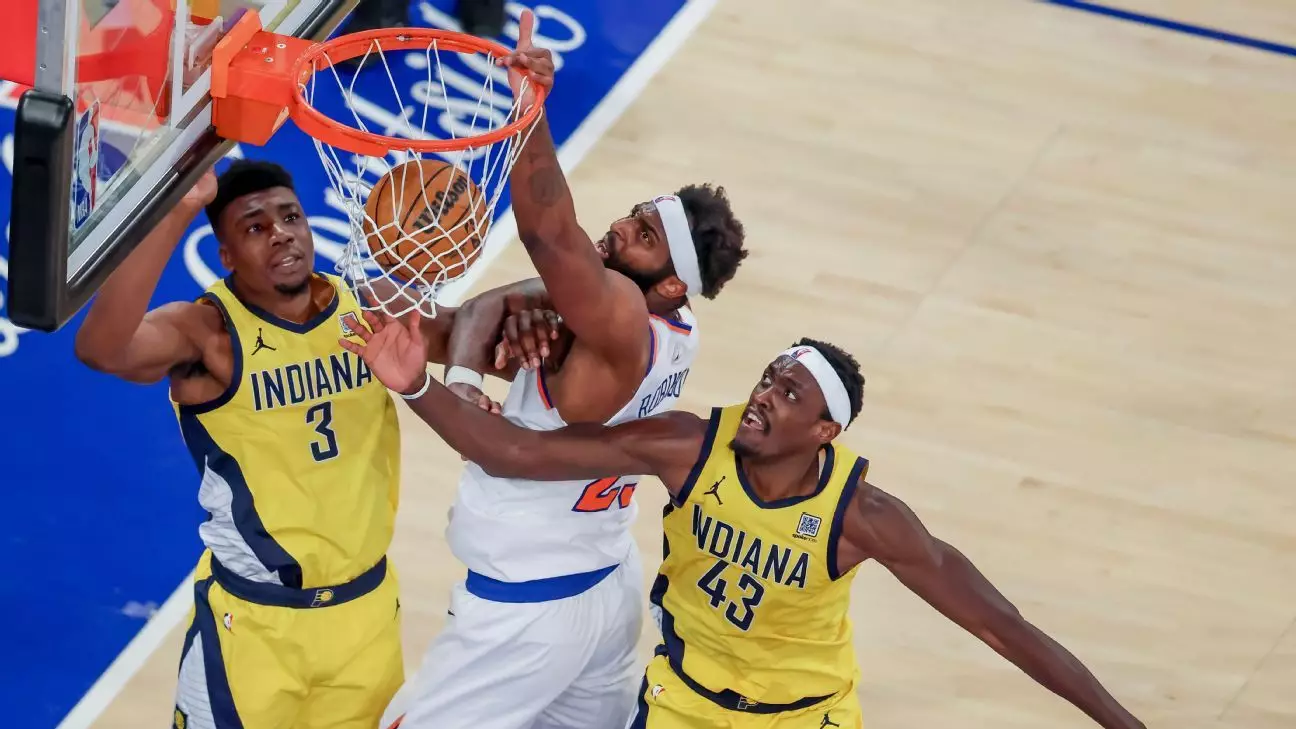In a shocking turn of events for the Indiana Pacers, Thursday’s 111-94 loss to the New York Knicks stands out as a glaring blemish on an otherwise promising playoff campaign. As fans looked on in horror, their team demonstrated an alarming inability to execute on both sides of the court. This wasn’t merely a lackluster performance; it was an outright disjointed display that raised questions about the team’s resilience and overall playoff readiness.
Star guard Tyrese Haliburton’s calm facade in the aftermath offers little solace, as stating, “there’s no need to panic” in the face of such an abysmal outing feels almost dismissive. Indeed, his comments, while well-intentioned, highlight a deep-seated issue—the belief that simply maintaining composure will suffice in the face of mediocrity. The Pacers have been flashy at moments this season, but their disjointed effort in Game 5 revealed a need for deeper introspection and personal accountability among the players.
Identifying the Gaps
Indiana’s performance was marred by a staggering 20 turnovers, which is a number that should spark alarm. With their starting five contributing only 37 points—some of the poorest scoring displays of the playoffs—it’s clear that the usual offensive machinery is showing serious wear and tear. Coach Rick Carlisle’s assessment, pointing out the “lack of force and attitude,” resonates deeply. Basketball is as much a mental game as it is a physical one, and the inability to establish momentum early in the game reflects a worrying weakness in the team’s mental fortitude.
A team that allowed itself to be outmatched for an entire game could easily spiral into self-doubt, which is a dangerous proposition in the high-stakes world of playoff basketball. What happened to the fierce competitive spirit that defined them earlier in the series? Is it really just a matter of bouncing back, or do deeper issues lurk beneath the surface?
Individual Struggles and Collective Failures
The stark contrast between Haliburton’s historic Game 4 performance and his uninspiring 8-point outing in Game 5 illustrates an unsettling trend. His contribution dwindled to just 24% of the team’s scoring—down significantly from previous games where he was the driving force behind their offensive runs. What’s particularly troubling is Haliburton’s admission that he must “be better.” It makes one wonder: If a star player feels subpar, what does that say about the system surrounding him? A player can’t rise above the fray alone; he needs the collective support of his teammates, and judging by Thursday’s performance, that support was sorely lacking.
Moreover, while Benedict Mathurin managed to score 23 points off the bench, a handful of individual achievements cannot mask the collective failures etched into the Pacers’ style of play. An inability to find a rhythm and move cohesively as a unit leads to a dangerous cocktail of half-hearted efforts and unfulfilled potential.
The Mental Game: Bouncing Back
Aaron Nesmith’s blunt observation—that sometimes you have to “get punched in the face” to grow—carries weight, but it’s hard to overlook the fact that the Pacers need to learn and adapt quickly. The impending Game 6 presents an opportunity, yet the importance of responding isn’t just about showing up; it’s about acknowledging flaws and addressing them directly.
While they hold a tenuous 3-2 lead in the series, one can’t help but ponder the long-term implications of a loss like this. If they were to falter at home, it would not just be a blip; it could reverberate throughout the postseason and impact the psyche of a team that has been grappling with inconsistency.
Ultimately, the time has come for the Pacers to rediscover their identity—an identity characterized by dynamic play, mental resilience, and a unified front. The path forward is fraught with challenges, but the journey is as significant as the destination. Fans and players alike are left to wonder if they have what it takes to create a powerful narrative from this painful chapter.

Leave a Reply